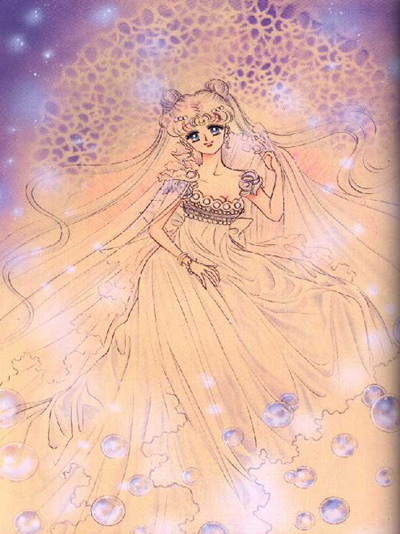
|

Mythology: Greek and Roman
Goddess of the Moon
Selene: Her name is from the Greek for light, radiance, and brightness. She was the daughter of Hyperion and Theia, and sister to Eos and Helios. Once her brother finished his journey across the sky, it was Selene's turn to pull her chariot across the heavens. She paused only to kiss her lover Endymion (the setting sun).
Selene was the Greek goddess of the Moon. She has been pictured as a beautiful young girl wearing a long white gown with wings, a golden diadem, and having long white hair. The power associated with the Moon and deity Selene was enchantment. The color white is symbolic of the Moon and Diana, as well as the metal silver. For many cultures, the Moon is a feminine symbol. It also symbolizes the soul, eternity, and immortality.
Silver Crystal: Ginzuishou. As far as symbols go, the stone has been considered the goddess' power or to hold her power. The stone symbolic of the Moon is the crystal, and the metal associated with the Moon is silver. Thus, both Serenitys and Small Lady have their power in the Silver Crystal.
|
|
Endymion
Endymion was a beautiful shepherd boy of Asia Minor, the mortal lover of the moon goddess Selene. Each night he was kissed to sleep by her. She begged Zeus to grant him eternal life so she might be able to embrace him continually. Zeus complied, putting Endymion into eternal sleep and each night Selene visits him on Mt. Latmos, near Milete. The ancient Greeks believed that his grave lied on this mountain. Selene and Endymion had fifty daughters.
|
|
Sailor Scouts
Lita, Sailor Jupiter: Jupiter is the Roman name for Zeus. As you can see Jupiter's element so to say is Thunder and Zeus hurrled Thunder Bolts down to earth. Zeus was the strongest of the gods.
Mina. Sailor Venus: Venus is the Roman name for Aphrodite, the goddess of love.
Amy, Sailor Mercury: Mercury is the Roman name for Hermes. Hermes possesed intelligance.
Rei, Sailor Mars: Mars is the Roman name for Ares. Ares is the god of war.
Setsuna, Sailor Pluto: Pluto is the Roman name for Hades. Hades is the god of the underworld.
Hotoru, Sailor Saturn: Saturn is the Roman name for Cronus.
Michiru, Sailor Neptune: Neptune is the Roman name for Poseidon, god of the waters and seas.
Haruka, Sailor Uranus: Uranus is the Roman name for Sky , the god of the sky, father of Cronus.
|
|
Andromeda the Princess
Andromeda was the princess of Ethiopia, daughter of Cepheus and Cassiopeia. Cassiopeia was a boastful woman, and foolishly bragged that she was more beautiful than Juno, the queen of the gods, and the Nereids. In order to avenge the insult to his nymphs, Neptune sent a sea monster to ravage the Ethiopian coast. (Some accounts state that the constellation Cetus represents the sea monster, but a more common view of Cetus is that he is a peaceful whale.)
The horrified king consulted Ammon, the oracle of Jupiter, who said that Neptune could be appeased only by sacrificing Cassiopeia's beautiful virgin daughter, Andromeda, to the monster. Andromeda was duly chained to a rock on the coast, fully exposed to the monster. Fortunately for her, the hero Perseus happened to be flying by on his way back from killing the Gorgon Medusa:
When Perseus saw the princess, her arms chained to the hard rock, he would have taken her for a marble statue, had not the light breeze stirred her hair, and warm tears streamed from her eyes. Without realizing it, he fell in love. Amazed at the sight of such rare beauty, he stood still in wonder, and almost forgot to keep his wings moving in the air. As he came to a halt, he called out: "You should not be wearing such chains as these--the proper bonds for you are those which bind the hearts of fond lovers! Tell me your name, I pray, and the name of your country, and why you are in chains."
At first she was silent; for, being a girl, she did not dare to speak to a man. She would have concealed her face modestly behind her hands, had they not been bound fast. What she could do, she did, filling her eyes with starting tears. When Perseus persisted, questioning her again and again, she became afraid lest her unwillingness to talk might seem due to guilt; so she told him the name of her country, and her own name, and she also told him how her mother, a beautiful woman, had been too confident in her beauty.
Before she had finished, the waters roared and from the ocean wastes there came a menacing monster, its breast covering the waves far and wide. The girl screamed. Her sorrowing father was close at hand, and her mother too. They were both in deep distress, though the mother had more cause to be so (Metamorphoses IV 674-692)
Perseus says to Andromeda's parents that he'll kill the monster if they agree to give him their daughter's hand in marriage. They of course give him their consent, and Perseus kills the monster. (His exact method of doing so varies in different versions of the myth. Ovid has Perseus stab the monster to death after a drawn-out, bloody battle, while other versions have the hero simply hold up the head of Medusa, turning the monster to stone.) Andromeda is freed, and the two joyously marry.
Andromeda is represented in the sky as the figure of a woman with her arms outstreched and chained at the wrists.
Vote for this site!
|
|
|
|
|
|
|
|
|
|
